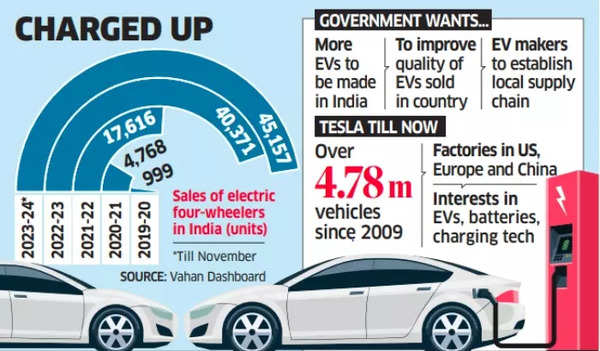While the meeting primarily revolved around general policy discussions, it emphasized the need to expedite approvals for Tesla’s proposed investment in India, a top official was quoted as saying.Ministries, including commerce and industry, heavy industry, and electronics and IT, have been engaging in talks regarding Tesla’s plans following a meeting between Tesla CEO Elon Musk and Prime MinisterNarendra Modi in the United States during June’s state visit. It’s worth noting that India has extended an invitation to US President Joe Biden to be the chief guest for the Republic Day celebrations on January 26.
Senior Tesla executives have been in dialogue with the Indian government about establishing car and battery manufacturing facilities in India. Tesla has also expressed interest in bringing its supply chain ecosystem to the country.
Government departments have been tasked with resolving any differences with Tesla to facilitate the announcement of the company’s India manufacturing plan at the earliest possible date, another official told the financial daily.
Government looks to expedite Tesla entry in India
One major point of contention has been the import duty structure. Tesla had previously requested a 40% import duty on fully assembled electric cars, in contrast to the existing rates of 60% for vehicles priced below $40,000 and 100% for those priced above that threshold.
Tesla has sought a 40% import duty on fully assembled electric cars, aiming to distinguish its vehicles as electric and not luxury cars. India’s customs duty system treats electric cars and hydrocarbon-powered vehicles equally, imposing substantial tariffs to promote domestic manufacturing.
The US-based electric vehicle manufacturer has expressed a desire to begin selling cars in India before establishing a local manufacturing unit.
To address this issue, there is consideration of introducing a new import policy category that would lead to lower taxation for environmentally-friendly vehicles. Officials stress that this potential incentive would not be exclusive to Tesla but extended to any entity committed to setting up electric vehicle manufacturing facilities.
Tesla had abandoned its earlier plans for India due to the lack of progress in import duty reduction negotiations. The Indian government had insisted on a commitment to local manufacturing as a prerequisite for any import duty concessions. Additionally, the government encouraged Tesla to apply for the production-linked incentive scheme, offering direct subsidies to manufacturers in place of customs duty concessions.
